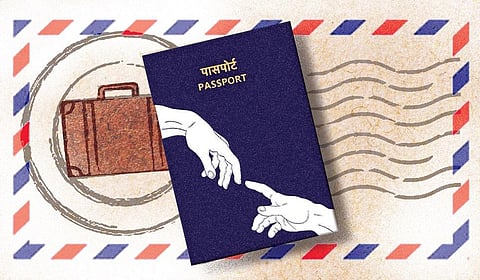

How often have you heard that someone you know has passed away, and the body is waiting, either in the morgue or on ice for the family to get a last glimpse and proceed with the formalities of the funeral.
Chances are, such a person is quite old. Definitely in the eighties. Chances are that the children of said person are living overseas, having set up their homes and built their careers there. Chances are the grandchildren of the dead person hold foreign passports, and have seen their grandparents once, maybe up to four times in their lives, if they are pre-teens.
Nothing wrong in this. Everyone is entitled to seeking a better life. And pastures beyond the known are often green, not merely in perception, but in reality too.
Such moves to fresh pastures usually happen around the start of a career. Or the preparation for it, with a seat in a college that will bring with its degree, guaranteed privileges. But even as fond parents, beaming with pride, wave their wards off at the airport gate on the first step of a new journey, the thought might whisper in the subconscious that as parents, they might be embarking on a new journey themselves.
Especially if, tasting the heady brew of financial success and job satisfaction, and sinking into the ease of a life with assured amenities, the ward chooses to follow up the degree with a job, and then another and finally settles down to seek a green card, an NRI card, a PIO card, whatever it is that gives them the comfort of knowing they are Indian at heart, but have chosen to live beyond the borders of their country. And chances are, with their children growing up with foreign passports, they may never be able to return.
What a dilemma it is for the two generations caught on a see-saw they cannot get off from. For the younger adventurer, the placebo of knowing that the parents are well cared for with the monthly remittances grows less effective as the parents age. And now their subconscious is asking them, if they want to die in a foreign land, but can they return to their country leaving behind the children and their children?
For the ones who got left behind, the advancing years reach out with tentacles of fear—of illness, loneliness, of dying alone. Old couples tend to each other, wondering as each struggles with the benedictions of old-age debilitations, which of them will go first, and who will be left alone.
Widows and widowers live each day, one day at a time, their lives strung between FaceTime and video calls with their progeny; the house they built echoing with their coughing or the voices of caretakers. Many live comfortable lives, but comfort is no balm for loneliness; in fact it sharpens its edge further.
Waiting becomes a given. For the phone call, for a glimpse of the grandchildren, for the yearly visit; small joys that deny momentarily the fear of dying alone.
Then, when the inevitable happens, and the illness is unremediable, and tickets are hastily purchased, life and career put on hold as children take up the threads of filial duties, often it is too late.
The person in ICU attached by tubes to machines is not the parent who was left behind. And there is no way of understanding the look in the eyes that look back from the bed. It's worse still, if the only duty left is to claim the body and send it on its last journey.
A journey still heavy with the loneliness of past years.
It’s really nobody’s fault. This dilemma. Just a state of how things are. In homes across India. Nay, across the world.
Sathya Saran is an author and Consulting Editor, Penguin Random House. She can be reached at saran.sathya@gmail.com.